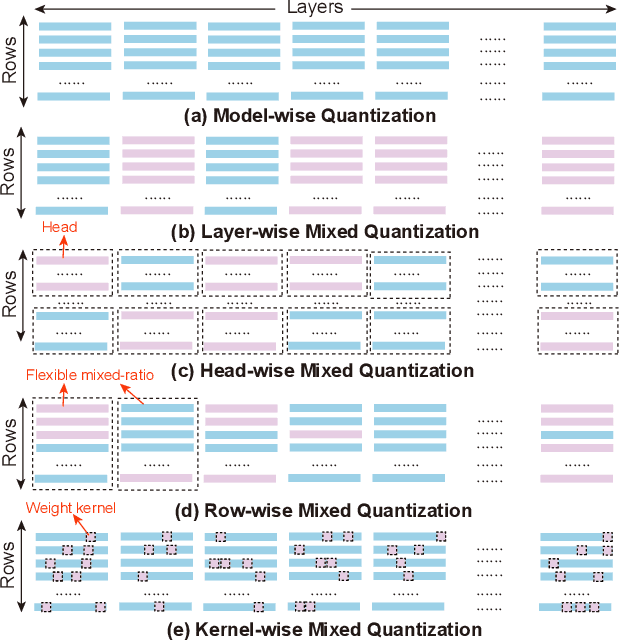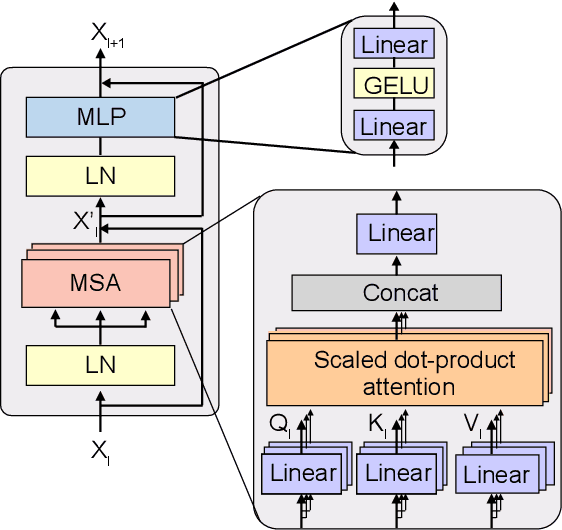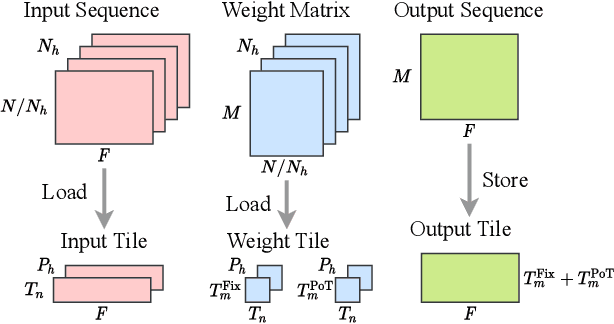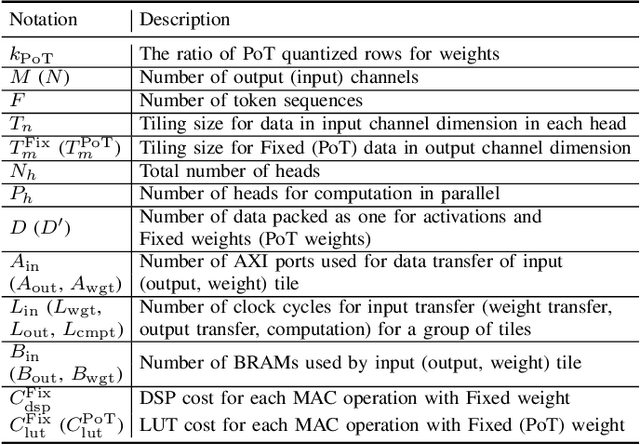Alec Lu
Quasar-ViT: Hardware-Oriented Quantization-Aware Architecture Search for Vision Transformers
Jul 25, 2024



Abstract:Vision transformers (ViTs) have demonstrated their superior accuracy for computer vision tasks compared to convolutional neural networks (CNNs). However, ViT models are often computation-intensive for efficient deployment on resource-limited edge devices. This work proposes Quasar-ViT, a hardware-oriented quantization-aware architecture search framework for ViTs, to design efficient ViT models for hardware implementation while preserving the accuracy. First, Quasar-ViT trains a supernet using our row-wise flexible mixed-precision quantization scheme, mixed-precision weight entanglement, and supernet layer scaling techniques. Then, it applies an efficient hardware-oriented search algorithm, integrated with hardware latency and resource modeling, to determine a series of optimal subnets from supernet under different inference latency targets. Finally, we propose a series of model-adaptive designs on the FPGA platform to support the architecture search and mitigate the gap between the theoretical computation reduction and the practical inference speedup. Our searched models achieve 101.5, 159.6, and 251.6 frames-per-second (FPS) inference speed on the AMD/Xilinx ZCU102 FPGA with 80.4%, 78.6%, and 74.9% top-1 accuracy, respectively, for the ImageNet dataset, consistently outperforming prior works.
HeatViT: Hardware-Efficient Adaptive Token Pruning for Vision Transformers
Nov 15, 2022



Abstract:While vision transformers (ViTs) have continuously achieved new milestones in the field of computer vision, their sophisticated network architectures with high computation and memory costs have impeded their deployment on resource-limited edge devices. In this paper, we propose a hardware-efficient image-adaptive token pruning framework called HeatViT for efficient yet accurate ViT acceleration on embedded FPGAs. By analyzing the inherent computational patterns in ViTs, we first design an effective attention-based multi-head token selector, which can be progressively inserted before transformer blocks to dynamically identify and consolidate the non-informative tokens from input images. Moreover, we implement the token selector on hardware by adding miniature control logic to heavily reuse existing hardware components built for the backbone ViT. To improve the hardware efficiency, we further employ 8-bit fixed-point quantization, and propose polynomial approximations with regularization effect on quantization error for the frequently used nonlinear functions in ViTs. Finally, we propose a latency-aware multi-stage training strategy to determine the transformer blocks for inserting token selectors and optimize the desired (average) pruning rates for inserted token selectors, in order to improve both the model accuracy and inference latency on hardware. Compared to existing ViT pruning studies, under the similar computation cost, HeatViT can achieve 0.7%$\sim$8.9% higher accuracy; while under the similar model accuracy, HeatViT can achieve more than 28.4%$\sim$65.3% computation reduction, for various widely used ViTs, including DeiT-T, DeiT-S, DeiT-B, LV-ViT-S, and LV-ViT-M, on the ImageNet dataset. Compared to the baseline hardware accelerator, our implementations of HeatViT on the Xilinx ZCU102 FPGA achieve 3.46$\times$$\sim$4.89$\times$ speedup.
Auto-ViT-Acc: An FPGA-Aware Automatic Acceleration Framework for Vision Transformer with Mixed-Scheme Quantization
Aug 10, 2022



Abstract:Vision transformers (ViTs) are emerging with significantly improved accuracy in computer vision tasks. However, their complex architecture and enormous computation/storage demand impose urgent needs for new hardware accelerator design methodology. This work proposes an FPGA-aware automatic ViT acceleration framework based on the proposed mixed-scheme quantization. To the best of our knowledge, this is the first FPGA-based ViT acceleration framework exploring model quantization. Compared with state-of-the-art ViT quantization work (algorithmic approach only without hardware acceleration), our quantization achieves 0.47% to 1.36% higher Top-1 accuracy under the same bit-width. Compared with the 32-bit floating-point baseline FPGA accelerator, our accelerator achieves around 5.6x improvement on the frame rate (i.e., 56.8 FPS vs. 10.0 FPS) with 0.71% accuracy drop on ImageNet dataset for DeiT-base.
 Add to Chrome
Add to Chrome Add to Firefox
Add to Firefox Add to Edge
Add to Edge